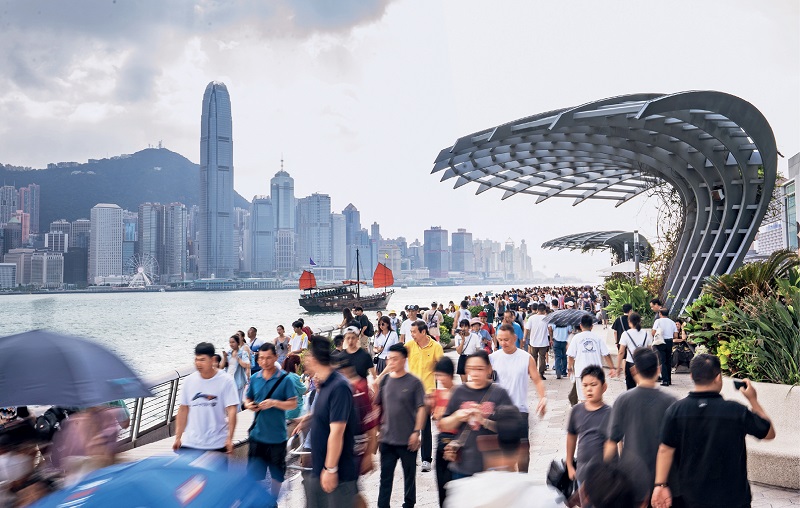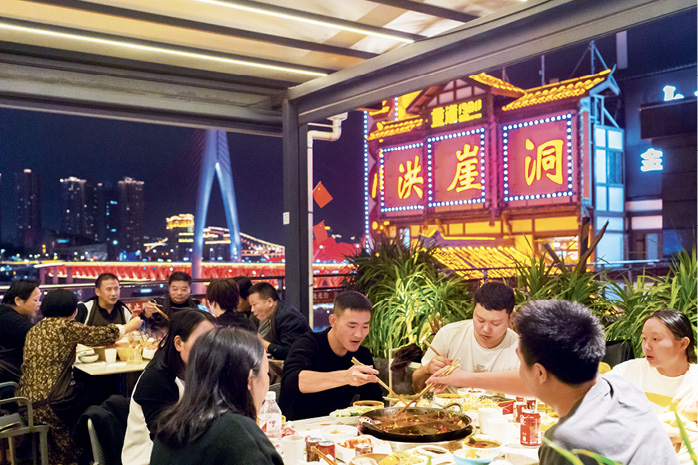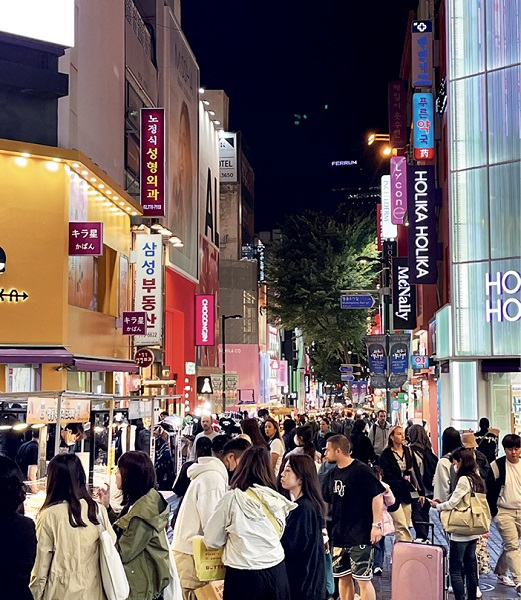
Tourists throng the Avenue of Stars, a scenic seaside promenade in the east of Tsim Sha Tsui, Hong Kong on September 30, 2023.
The National Day holiday in China normally runs for seven days, but this year, it became a super golden holiday week due to various reasons. It closely followed the traditional Mid-Autumn Festival, which extended the holiday to eight days. On top of that, the 19th Asian Games were in full swing during the golden week, and “traveling with the Asian Games” became a keyword in the host city Hangzhou as well as other co-host cities.
According to the Ministry of Culture and Tourism, 826 million domestic trips were made during the holiday, an increase of 71.3 percent from last year. Tourism revenue was a whopping RMB 753.43 billion, nearly 130 percent more vis-à-vis the sum in this period last year. The policies for developing the tourism industry clearly had a significant impact, and the tourism market rebounded with new characteristics and trends.
Biggest Feature of the Golden Week
Compared with the past three years, the biggest feature of this golden week was the recovery of outbound tourism. According to Chinese online travel agency giant Ctrip, outbound travel orders increased by more than eight times year on year. Data from Chinese online travel agency LY.com showed hotel and air ticket bookings for outbound trips exceeded those in the same period before the epidemic. The most popular destinations included Thailand, South Korea, Japan, Singapore, Malaysia, the United Arab Emirates, Indonesia and Egypt.
The popularity of such outbound destinations as Europe, Africa, South America, and Australia, also grew rapidly. Air ticket booking data showed the post-90s generation is still the main force among outbound tourists, accounting for nearly 30 percent. The post-00s generation, the generation born in the new millennium, showed the fastest growth – 22 percent, which was the same proportion as the post-80s generation.
In the past, the outbound travel products sold were mainly those catering to large travel groups of more than 40 people. But this year, tourists are more willing to choose products, such as small groups and private groups, and pay more attention to related experiences, such as food and tours during the trip. Parent-child packages, skiing, overseas study tours and other theme travel products were also popular. After China announced in August the third batch of countries and regions where outbound group travel could resume, outbound travel has continued to rise, reaching a peak during the golden week.
Data also showed that outbound tourists are more willing to make their own travel plans and book local-feature activities, such as snorkeling and helicopter sightseeing. According to Fliggy, an online travel platform under the Alibaba Group, during the golden week, overseas local recreation services increased by nearly nine times compared with last year, with visits to the Maldives, Luxembourg, French Polynesia, Argentina, Egypt and Kenya showing a hefty rise.

Consumers enjoy a meal at a hot pot restaurant in Yuzhong District, Chongqing on October 8, 2023.
The Magic of 3C
Due to the long holiday, tourists booked their itineraries earlier and significantly increased the proportion of trans-provincial and long-distance travel. According to Ctrip, orders on cross-provincial travel accounted for 51 percent, more than double of the figure last year. Long-distance travel orders accounted for 39 percent, also doubling the orders from 2022. Xinjiang, Yunnan and other distant border areas have become hot destinations, with orders for group tours in these places nearly doubling year on year.
The golden week, which falls during autumn with a highly enjoyable weather, is one of the best times for travels and explorations, especially across the country. 3C tourism – citywalk, countryside tourism, and cultural tourism – has become a trend to discover China’s beauty. Citywalks explore a city’s streetscape architecture, natural landscapes, dining and entertainment, and shopping malls. According to Ctrip, citywalk searches on its platform increased by more than seven times year on year.
Countryside tourism, buoyed by the beautification of the countryside and stunning landscapes, also drew more people to rural areas. According to Ctrip, after eight consecutive weeks of growth in the summer, rural tourism still maintained rapid growth during the golden week. The number of hotel orders for rural tours nationwide doubled year on year. The post-90s generation accounted for 30 percent of rural tourism consumers, becoming the fastest growing consumer group. The rural areas of Beijing, Hangzhou, Guangzhou, Shanghai, Suzhou, and Huangshan have become popular rural destinations.
Cultural tourism was particularly welcomed during the National Day holiday. Multiple cultural tourism packages, such as tourism plus music, cultural activity, food, live performances prevailed. Searches for music festivals and performances increased by more than four times and three times, respectively, year on year.
3C tourism also drove the growth of consumption. According to Vipshop, a leading online discount retailer for brands in China, sales of travel equipment increased sharply. Sales of travel goods soared 590 percent year on year, travel maps 79 percent, suitcases 49 percent and sunglasses 45 percent. Sales of travel-related clothing and accessories also grew rapidly. For example, sales of children’s traditional Chinese costumes and women’s traditional qipao dress increased by 207 percent.
Traveling with Asian Games
The Hangzhou Asian Games were in full swing during the Golden Week, and “traveling with the Asian Games” has also become the keyword of the long holiday in Hangzhou and the Asian Games co-host cities. Liu and his family from Zhengzhou went to Hangzhou to watch several matches, and then spent three days visiting five co-host cities: Ningbo, Jinhua, Huzhou, Wenzhou and Shaoxing.
The popularity of sports + tourism has increased. According to data from online platforms Meituan and Dianping, during the holiday, thanks to the Asian Games in full swing during the Golden Week, the number of service consumption orders in Zhejiang increased by more than 195 percent compared with 2019. In addition, Hangzhou catering dine-in orders increased by 443 percent, and sports and fitness orders increased by 762 percent. Looking at the whole country, during the holidays, billiards, tennis, and squash orders increased by more than 1,000 percent, and niche sports such as archery, equestrian, and rock climbing have become known by more people. The Asian Games has stimulated homestays in Zhejiang Province. According to Tujia.com, as of October 6, the number of homestay bookings in Zhejiang Province increased by 1.2 times compared with 2019. The Asian Games also gave more sports fans the opportunity to explore Zhejiang. According to fliggy.com, the number of hotel and homestay rooms during the holiday increased by more than 60 percent compared with 2019. Driven by the Asian Games, sales of sports and outdoor wear have also grown rapidly.

Myeongdong Shopping District in South Korea is crowded with Chinese tourists on October 5, 2023.
Favorable Policies
Favorable policies played a considerable role in boosting the tourism industry. On September 27, the State Council announced 30 measures to stimulate tourism consumption and promote high-quality tourism development. They included increasing the supply of high-quality tourism products and services and strengthening inbound tourism. Besides, the Ministry of Public Security and the National Immigration Administration announced regional visa-free entry policies, including 15-day visa-free travel for cruise groups at Shanghai ports, and visa-free entry to Hainan for travelers from 59 countries.
In addition, during the golden week, various places held tourism festivals and art weeks, designed innovative tourism products, and issued cultural tourism consumption coupons to attract more visitors and promote cultural tourism.
According to Dai Bin, president of China Tourism Academy, throughout the holiday, urban and rural residents’ willingness to travel and consume tourism products stayed at a high level. On an average, more than 100 million people traveled every day, creating about RMB 100 billion of tourism revenue daily.
“Through the consumption boom during the golden week, it can be seen that the holiday economy continues to be buoyant, and consumer confidence is growing. The consumption of services, such as catering, tickets, accommodations and travel, has reached a new high in five years, further enhancing its role as a new engine for economic growth,” said Li Jiwei, vice director of Meituan Research Institute. The golden week demonstrated the resilience and vitality of China’s economy, helping the recovery of the domestic economy.
The overall industry chain, benefiting from the increase in travel demand, has been recovering this year. The number of tourists and tourism revenue have basically recovered, reaching the level of 2019. A number of listed tourism companies achieved a year-on-year turnaround.
Steady Growth
This year’s golden week amazed the foreign media. “The large flow of more than 2 billion people during the holiday shows the momentum of China’s economic growth,” said a report by South Korea’s Asia Economic Daily dated October 6. With the surging travel demand during the Mid-Autumn Festival and National Day holidays, China’s cross-regional travel volume is expected to exceed 2 billion trips. This is a sign of China’s sustained economic recovery, showing the strong endogenous driving force of its economy.
Transportation is the artery of economic development, and the number of travelers during the golden week reached a new high, proving that high-quality transportation is injecting new impetus into China’s modernization.
According to CNN, in addition to the surge in the number of travelers during the golden week, the latest data also show that China’s economy has improved and stabilized after the government increased efforts to stimulate consumption. China’s purchasing managers’ index, a measure of manufacturing, rose to 50.2 in September from 49.7 in August, entering expansion territory for the first time since March. A reading above 50 denotes expansion and below it means contraction in growth.
In addition, in August, China’s industrial profits increased by 17.2 percent and retail sales expanded 4.6 percent year on year. According to a research report from global financial service group Nomura, there is growing evidence that China’s economy is showing steady growth. 
ZHANG LIJUAN is a reporter with China Report.